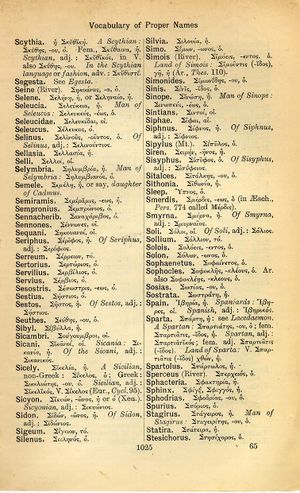Solon
Ζευχθεὶς γάμοισιν οὐκέτ' ἔστ' ἐλεύθερος → Haud liber ultra est, nuptiae quem vinciunt → Wer durch der Ehe Joch vereint, ist nicht mehr frei
English > Greek (Woodhouse)
Σόλων, -ωνος, ὁ.
Latin > English (Lewis & Short)
Sŏlōn: ōnis, m., = Σολώνιον,
I a city of the Allobroges, in Gallia Narbonensis, north-west of the Rhodanus, perh. near the modern Sortie, Liv. Epit. 103.
Sŏlon: or Sŏlo (the latter in Cic. Rep. 2, 1, 2), ōnis, m., = Σόλων.
I A famous legislator of the Athenians, one of the seven sages of Greece, Cic. Brut. 7, 27; 10, 39; id. de Or. 1, 44, 197; id. Leg. 2, 23, 59; 2, 25, 64; Liv. 3, 31 fin.; Juv. 10, 274.—Plur.: aerumnosi Solones, i. e. philosophers, Pers. 3, 79 al.—
II A commander in Pydna, Liv. 44, 45.
Latin > French (Gaffiot 2016)
Sŏlōn¹² et Sŏlō, ōnis, m. (Σόλων), Solon
1 législateur célèbre d’Athènes [lois de Solon, constitution de Solon ; un des sept sages de la Grèce : Cic. Br. 27
2 préfet de Pydna : Liv. 44, 45, 7.
Latin > German (Georges)
Solōn u. Solo, ōnis, m. (Σόλων), einer von den sieben Weisen Griechenlands, berühmter Gesetzgeber der Athener, um 600 v. Chr. Plaut. asin. 599. Cic. Brut. 27. Liv. 2, 31, 8: Nom. Solo, Cic. de rep. 2, 2: Nom. Solon, Val. Max. 5, 3. ext. 3; 8,7. ext. 14. Sen. ep. 90, 6. Hyg. fab. 221. Auson. lud. sept. sap. 82. p. 106 Schenkl.

